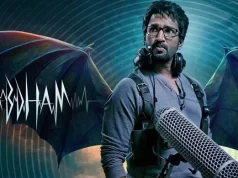The nuanced, heartfelt drama explores queerness, identity, and acceptance through sharp writing, irony, and well-etched characters, delivering a powerful yet sensitive take on love’s universality
Kaadhal Enbadhu Podhu Udamai (3.5 / 5)
For years, Tamil filmmakers have relied on the bike ride as a visual representation of two people falling in love—so much so that it has become a cliche. Yet, perhaps the cleverest choice of director Jayaprakash Radhakrishnan in his latest drama Kaadhal Enbadhu Podhu Udamai (KEPU) is to use the trope to show his lead queer couple fall in love. Paired with Uthara Unnikrishnan’s evocative rendition of ‘Theeyai,’ the scene beautifully reinforces the film’s core idea—that love, in all its forms, is indeed for everyone. Set almost entirely within the confines of a single house and unfolding through seven characters, the film delves into sexual identity without slipping into didacticism. It creates space for a much-needed conversation—one that feels urgent, intimate, and deeply relevant.
Cast: Lijomol Jose, Anusha Prabhu, Rohini, Vineeth, Kalesh, Deepa
Director: Jayaprakash Radhakrishnan
Rating: 3.5/5
In Kaadhal Enbadhu Podhu Udamai, Sam (Lijomol) confides in her mother, Lakshmi (Rohini), about being in love. Unlike most Indian parents, Lakshmi is more than ready to welcome her daughter’s ‘man’ with open arms—until she learns that Sam’s partner is a woman. What follows is a series of layered conversations on queerness, sexual identity, and individuality, making space for a deeper, more nuanced discourse.
Jayaprakash could have taken the straightforward route with KEPU, but instead, he chooses to shape his characters with irony. Lakshmi, a motivational speaker with a presence on YouTube, is not able to apply the messages of love she preaches to the public to her own daughter. In one scene, her ex-husband Devaraj (Vineeth) says with a sneer, “Penniyam nu pesi pesi un ponna epdi valathirka paaru,” blaming her progressive upbringing for their daughter’s choices. Yet, despite having little involvement in Sam’s life, Devaraj still asserts that he will not “allow” her to be in a relationship with another woman. Meanwhile, Mary, the housemaid played by Deepa, comes from a less privileged background yet is one of the first to truly understand Sam’s love. These ironies, woven throughout Kaadhal Enbadhu Podhu Udamai, add layers of complexity to the characters, making their actions—and the film’s messaging—feel all the more compelling.
While KEPU isn’t the kind of drama one expects twists and turns from, its sharp writing ensures it never slips into sermonising. Jayaprakash takes his time setting the conflict in motion, building a world that is tense yet laced with humour—often making us uncomfortable, but also offering well-placed comedic relief. Kalesh, who plays Sam’s best friend, Ravindra, embodies the role of an ally to perfection. Stuck between Sam’s inability to tell the truth and Lakshmi’s assumption that he is her boyfriend, Ravindra communicates volumes through minimal dialogue and impeccable facial expressions. So, when the film reaches its crescendo with the big revelation, the payoff feels truly earned.
Jayaprakash ensures that well-placed comedic breaks keep the heavy dialogues from feeling monotonous. KEPU doesn’t just stop at spreading awareness—it goes beyond. Many of us aspire to be allies but often struggle with doubts or simply don’t know how. The film beautifully navigates these nuances. Take Ravindra, for instance. We see that his journey to allyship was gradual, and even now, there are remnants of internalised homophobia within him. In another scene, the well-meaning yet naive Mary innocently asks the couple how intimacy works between them or who plays the “husband” in the relationship. Instead of taking offence, the couple patiently clarifies, reinforcing the idea that open conversations are key to clearing biases. KEPU doesn’t shame anyone for their ignorance or for taking time to understand sexual and gender identity—and that might just be its biggest strength.
The film isn’t afraid to venture into dark spaces, shedding light on what the Indian alternative to Western conversion therapy looks like. Yet, within its two-hour runtime, the film delivers a much-needed lesson to parents—without ever sounding patronising. A key reason this works is Jayaprakash’s spot-on casting. As Lakshmi, Rohini beautifully captures the internal turmoils of a mother and the double standards of many in society who mask themselves as progressive people. In a single moment, she shifts from being a warm, supportive mother to a fiercely resistant guardian, convinced that her child needs “saving.” Lijomol and Anusha are apt as Sam and Nandhini, justifying Jayaprakash’s decision to entrust them with the lead roles. Kalesh and Deepa, although supporting characters, shine as Ravindra and Mary, as they bring light-heartedness to the story, while also being strong allies with strict fundamentals. Vineeth, with his unsettling calmness, adds another layer of tension, completing an ensemble of brilliant performers who bring this nuanced drama to life.
KEPU is replete with metaphors—be it the butterflies symbolising transformation and personal growth or a shot of the lead couple running freely so others like them can follow, shedding their masks along the way. The film does not resort to the illusion that a single conversation can turn opposers into allies. But it does affirm that true love never wavers, no matter who you are. In the end, it reiterates that just as a parent’s love remains unwavering despite imperfections, love too knows no bounds—it transcends gender, fear, and prejudice, standing tall in its purest form.
News Credits: Cinema Express










